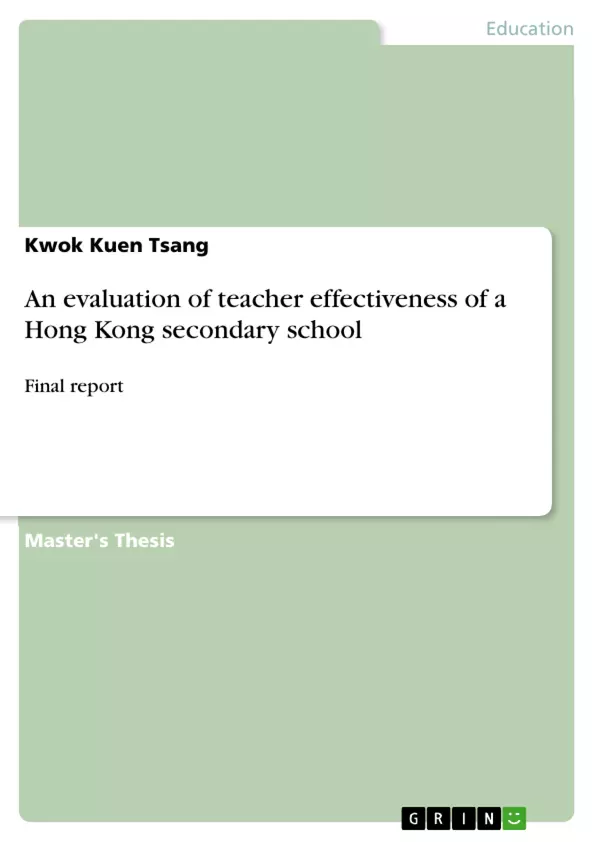In this study, the relationship between collective teacher effectiveness and school improvement
oriented culture is investigated through the case of ABC Secondary School. Collective teacher
effectiveness is conceptualized with both the model of total teacher effectiveness and the model of
continuous learning. Collective teacher effectiveness is regarded as the primary goal the school strives to
attain. On the other hand, school improvement oriented culture, which consists of an emphasis on
learning, collegiality and collaboration, is regarded as the value system of the school. Moreover, the
theoretical framework of this study includes characteristics of teachers (gender, age, and full-time
teaching experience) and the practices of academic divisions (the frequency and contents of formal
meetings, the encouraged activities, and the opportunities to participate in the decision-making process).
The research findings support the conceptions of collective teacher effectiveness and school
improvement oriented culture. The results show that school improvement oriented culture, in general,
caused collective teacher effectiveness directly and indirectly. Particularly, each cultural element had
different influential powers to collective teacher effectiveness, competence and performance. As a result,
a general model and three sub-models of collective teacher effectiveness for ABC Secondary School
were constructed. These findings also question the mechanism of goal-attainment proposed by the
theory of social system and provide us with a way to revise the current model of total teacher
effectiveness.
The recommendations to ABC Secondary School, the limitations of this study and the suggestions
for further research are also discussed in this report.
Inhaltsverzeichnis (Table of Contents)
- Chapter 1 Introduction
- Chapter 2 Literature Review
- Chapter 3 Theoretical Framework
- Chapter 4 Conceptualization and Operationalization
- Chapter 5 Research Method
- Chapter 6 Findings
- Chapter 7 Discussion
- Chapter 8 Recommendations
- Chapter 9 Limitations
Zielsetzung und Themenschwerpunkte (Objectives and Key Themes)
This study aims to investigate the relationship between collective teacher effectiveness and a school improvement-oriented culture, using ABC Secondary School as a case study. The research explores how this culture impacts academic division practices and, in turn, how these practices influence collective teacher effectiveness. The study also examines the role of teacher characteristics in relation to collective teacher effectiveness. The key themes explored in this research are:- Collective Teacher Effectiveness
- School Improvement Oriented Culture
- Practices of Academic Divisions
- Characteristics of Teachers
- Causal Relationships between Cultural Elements, Practices, and Teacher Effectiveness
Zusammenfassung der Kapitel (Chapter Summaries)
- Chapter 1 Introduction: This chapter introduces ABC Secondary School and the challenges it faces in the evolving educational landscape of Hong Kong. It highlights the importance of enhancing teacher effectiveness and fostering a positive school culture as key priorities for the school. It also outlines the research questions and objectives of the study.
- Chapter 2 Literature Review: This chapter presents a comprehensive review of existing literature on collective teacher effectiveness, school improvement-oriented culture, and their interconnectedness. It explores various models and theoretical frameworks that underpin the study's conceptualization of these constructs.
- Chapter 3 Theoretical Framework: This chapter elaborates on the theoretical foundation of the study, drawing upon existing theories and models to provide a framework for understanding the relationship between collective teacher effectiveness and school improvement-oriented culture. It also introduces key variables, such as teacher characteristics and practices of academic divisions, that are investigated in the study.
- Chapter 4 Conceptualization and Operationalization: This chapter details the operationalization of the key concepts and constructs investigated in the study. It defines and clarifies the specific measures and instruments used to assess collective teacher effectiveness, school improvement-oriented culture, and other relevant variables.
- Chapter 5 Research Method: This chapter describes the research methodology employed in the study. It outlines the research design, data collection methods, and data analysis techniques used to gather and analyze data relevant to the research questions.
- Chapter 6 Findings: This chapter presents the findings of the study, drawing on the data collected and analyzed. It examines the relationship between collective teacher effectiveness and school improvement-oriented culture, highlighting the influence of specific cultural elements and practices on teacher effectiveness and performance. The results also explore the relationship between teacher characteristics and collective teacher effectiveness.
Schlüsselwörter (Keywords)
This study focuses on the relationship between collective teacher effectiveness and a school improvement-oriented culture, exploring the impact of cultural elements and academic division practices on teacher effectiveness. The study incorporates key concepts such as teacher characteristics, goal-attainment mechanisms, and the influence of different cultural dimensions on teacher competence and performance.Frequently Asked Questions
What is "collective teacher effectiveness"?
It refers to the shared belief and actual capacity of a school's teaching staff to positively impact student learning through continuous learning and total performance.
How does school culture influence teacher performance?
A school improvement-oriented culture that emphasizes learning, collegiality, and collaboration directly and indirectly enhances collective teacher effectiveness.
What role do academic divisions play in school improvement?
The frequency of meetings, decision-making opportunities, and encouraged activities within academic divisions are key practices that drive teacher competence.
Do teacher characteristics like age or gender affect effectiveness?
The study investigates whether variables such as gender, age, and years of teaching experience correlate with the level of collective effectiveness in a secondary school setting.
What were the findings of the ABC Secondary School case study?
The research constructed a general model showing that cultural elements are powerful influencers of teacher competence and overall school goal-attainment.
- Citar trabajo
- Kwok Kuen Tsang (Autor), 2009, An evaluation of teacher effectiveness of a Hong Kong secondary school, Múnich, GRIN Verlag, https://www.grin.com/document/273178



